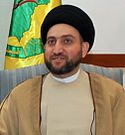Iraqi governorate elections, 2013
|
|
|||||||||||||||||||||||||||||
|---|---|---|---|---|---|---|---|---|---|---|---|---|---|---|---|---|---|---|---|---|---|---|---|---|---|---|---|---|---|
|
|||||||||||||||||||||||||||||
|
447 seats comprising 14 of the 18 governorates of Iraq |
|||||||||||||||||||||||||||||
|
|||||||||||||||||||||||||||||

Colours show the largest list in every governorate
State of Law Coalition
Shiite List
Liberal Coalition
Muttahidoon
Kurdistan Alliance
Independents/Local List
Elections not held
|
|||||||||||||||||||||||||||||
Governorate or provincial elections were held in Iraq on 20 April 2013, to replace the local councils in the governorates of Iraq that were elected in the Iraqi governorate elections of 2009. Elections took place in 12 of Iraq's 18 governorates. Elections didn't take place in the 3 governorates forming the Kurdistan Region or Kirkuk, Anbar, or Ninevah, meaning that a total of 378 provincial council seats were up for election.
The Iraqi government later decided on 19 March to delay the elections in the governorates of Anbar and Nineveh due to ongoing instability caused by the insurgency and the ongoing protests, prompting criticism from Muqtada al-Sadr and John Kerry. Elections for Anbar and Nineveh were held on 20 June.
There have been several disputes about the electoral law that is to be used for the election. The current electoral law, which was also used in the 2009 election, states that if certain parties don't get enough votes, their votes and seats are given to the larger parties. In the 2009 election this led to many smaller parties failing to take any seats. Because of the disproportionate affect this law had on smaller parties, the Supreme Court of Iraq declared the law unconstitutional, as it restricted democracy.
In spite of this ruling, and mostly due to the fact that because the law benefits the largest parties they have little incentive to change it, the law has yet to be changed. If not changed, the unconstitutional nature of the law however would make the 2013 election results vulnerable to a legal challenge. As a result, although this does not currently effect the work of the Independent High Electoral Commission, IHEC has been calling on the Iraqi government to pass changes to the law.
In response to this, on 13 December 2012 the Iraqi parliament voted to adopt the Sainte-Laguë method as the new electoral method.
...
Wikipedia



